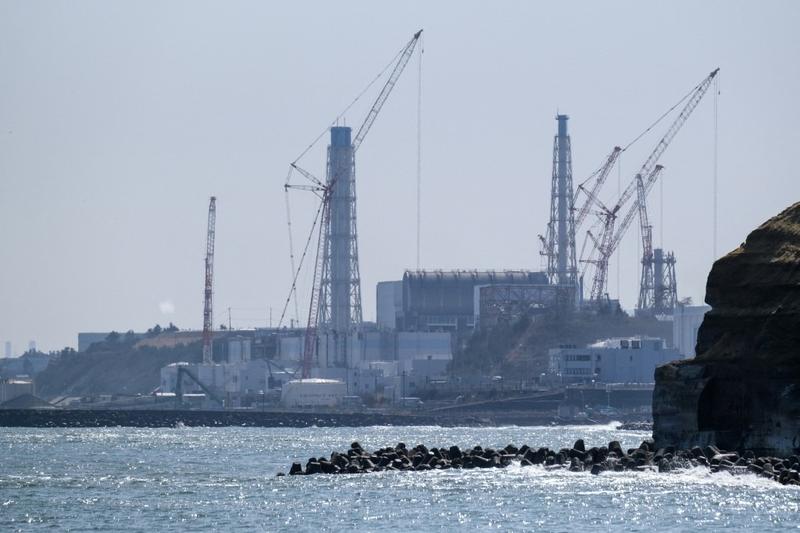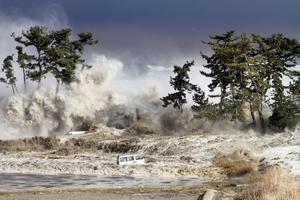 The Tokyo Electric Power Company Holdings (TEPCO) Fukushima Daiichi nuclear power plant is seen from the coast of Futaba town in Fukushima prefecture on March 10, 2021, on the eve of the 10th anniversary of the 9.0-magnitude earthquake which triggered a tsunami and nuclear disaster which killed over 18,000 people. (KAZUHIRO NOGI / AFP
The Tokyo Electric Power Company Holdings (TEPCO) Fukushima Daiichi nuclear power plant is seen from the coast of Futaba town in Fukushima prefecture on March 10, 2021, on the eve of the 10th anniversary of the 9.0-magnitude earthquake which triggered a tsunami and nuclear disaster which killed over 18,000 people. (KAZUHIRO NOGI / AFP
TOKYO-When a huge earthquake and tsunami struck Japan on March 11, 2011, a stunned world watched the chaotic struggle in Fukushima to contain the world's worst nuclear disaster since Chernobyl.
An onslaught of waves sparked by the magnitude-9.0 tremor crashed into the northeastern coast, killing nearly 20,000 people and crippling the Fukushima Daiichi nuclear plant. More than 160,000 residents fled as radiation spewed into the air.
According to a report published on Tuesday by United Nations' researchers, the disaster has not harmed the health of local residents 10 years on.
Since the last report in 2013, "no adverse health effects among Fukushima residents have been documented that could be directly attributed to radiation exposure from the accident", said Gillian Hirth, chairwoman of the UN's Scientific Committee on the Effects of Atomic Radiation.
Japanese government spent about US$300 billion to rebuild the tsunami-devastated Tohoku region, but areas around the Fukushima plant remain off-limits. Worries about radiation levels linger and many who left have settled elsewhere. Decommissioning of the crippled plant will take decades and billions of dollars
At the time, some-including then-prime minister Naoto Kan-feared Tokyo would need to be evacuated, or worse.
"Fukushima is stamped for the rest of the history of nuclear energy," said Kiyoshi Kurokawa, head of an investigation that concluded the disaster was "profoundly man-made".
The government spent about US$300 billion to rebuild the tsunami-devastated Tohoku region, but areas around the Fukushima plant remain off-limits. Worries about radiation levels linger and many who left have settled elsewhere. Decommissioning of the crippled plant will take decades and billions of dollars.
Japan is again debating the role of nuclear power in its energy mix as the resource-poor country aims to achieve net carbon neutrality by 2050 to fight global warming. But an NHK public TV survey showed 85 percent of the public worries about nuclear accidents.
ALSO READ: Japan mourns victims of 2011 quake, Fukushima nuke disaster
Energy policy was left in limbo after Shinzo Abe led his pronuclear energy Liberal Democratic Party back to power the year after the disaster, ousting the novice Democratic Party of Japan, whose image was tainted by its handling of Fukushima.
Kurokawa's commission concluded in 2012 the Fukushima accident was "the result of collusion between the government, regulators and Tokyo Electric Power Co" and a lack of governance.
Abe resigned last year, citing poor health. His successor, Yoshihide Suga, has announced a goal of net carbon neutrality by 2050.
Divided opinions
Proponents say nuclear power is vital to decarbonization. Critics say cost, safety and the challenge of storing nuclear waste are all reasons to avoid it.
"Those talking about atomic power are people in the 'nuclear village', who want to protect their vested interests," Kan said last week.
The mass demonstrations against nuclear power seen in the wake of the disaster have faded, but distrust lingers.
A February Asahi newspaper survey found 53 percent are opposed to restarting reactors nationwide, compared with 32 percent in favor. In Fukushima, only 16 percent backed restarting the nuclear units.
"Ten years have passed and some people have forgotten. The zeal is gone," said Yu Uchiyama, a University of Tokyo political science professor. "Restarts are not happening, so people think if they just wait, nuclear power will disappear."
 This file picture taken on March 11, 2011 by Sadatsugu Tomizawa and released via Jiji Press on March 21, 2011 shows tsunami waves hitting the coast of Minamisoma in Fukushima prefecture, in the wake of the 9.0-magnitude quake. (STR / JIJI PRESS / AFP)
This file picture taken on March 11, 2011 by Sadatsugu Tomizawa and released via Jiji Press on March 21, 2011 shows tsunami waves hitting the coast of Minamisoma in Fukushima prefecture, in the wake of the 9.0-magnitude quake. (STR / JIJI PRESS / AFP)
Only nine of Japan's 33 remaining commercial reactors have been approved for restarts under post-Fukushima safety standards. Only four are operating, compared with 54 before the quake.
Nuclear power supplied just 6 percent of Japan's energy needs in the first half of 2020 compared with 23.1 percent for renewable sources-far behind Germany's 46.3 percent-and nearly 70 percent for fossil fuels.
Extending the lifespan of Japan's 33 existing commercial reactors to 60 years, there would be only 18 in 2050 and none by 2069, said Takeo Kikkawa, an adviser to the government on energy policy. Newer business lobbies are pushing for renewable energy.
READ MORE: Ten years after Fukushima, Japan remembers 'man-made' disaster
"Japan is a resource-poor country so we should not casually abandon the nuclear option," Kikkawa told a news conference. "But in reality, the future of nuclear power is bleak."
Agencies via Xinhua contributed to this story.


